Fuel cell appliances are transforming home energy systems, offering you a cleaner, more efficient way to power your household. These devices convert chemical energy into electricity, using hydrogen and oxygen to produce water as a byproduct. You'll benefit from reduced energy costs, lower environmental impact, and increased energy independence. From kitchen appliances to heating and cooling systems, fuel cells can revolutionize your home's energy consumption. While initial costs may be higher, long-term savings and potential incentives make them an attractive option. As technology advances, fuel cells are becoming more compact and efficient, paving the way for widespread adoption. Discover how this innovative technology can reshape your home's energy future.
Understanding Fuel Cell Technology

Fuel cell technology has taken off in recent years, offering a promising alternative to traditional power sources. At its core, a fuel cell converts chemical energy into electrical energy through an electrochemical reaction. Unlike batteries, fuel cells don't run down or require recharging; they'll produce electricity as long as fuel is supplied.
The most common type for home applications is the proton exchange membrane (PEM) fuel cell. It uses hydrogen as fuel and oxygen from the air to generate electricity, with water and heat as byproducts. You'll find that fuel cells are highly efficient, often converting 50-60% of the fuel's energy into usable electricity.
To understand how they work, imagine two electrodes—an anode and a cathode—separated by an electrolyte membrane. Hydrogen enters at the anode, while oxygen enters at the cathode. The hydrogen molecules split into protons and electrons, with the protons passing through the membrane and the electrons flowing through an external circuit, creating an electric current.
At the cathode, these components combine with oxygen to form water.
Benefits of Fuel Cell Appliances
You'll find that fuel cell appliances offer several compelling advantages.
They can markedly reduce your energy costs while lowering your environmental impact through cleaner operation.
Additionally, these appliances contribute to increased energy independence by utilizing diverse fuel sources and reducing reliance on traditional power grids.
Reduced Energy Costs
Your wallet may breathe a sigh of relief when you switch to fuel cell appliances. These innovative devices can greatly reduce your energy costs by operating more efficiently than traditional appliances. Fuel cells convert chemical energy directly into electricity, minimizing energy losses associated with combustion and mechanical processes.
You'll notice lower utility bills as fuel cell appliances consume less energy to perform the same tasks. They're particularly effective during peak energy hours when electricity rates are highest. By generating power on-site, you'll also reduce your reliance on the grid, protecting yourself from rate hikes and power outages.
Fuel cell appliances can utilize various fuel sources, including natural gas, propane, or hydrogen. This flexibility allows you to choose the most cost-effective option in your area. Additionally, some regions offer incentives or rebates for adopting fuel cell technology, further lowering your upfront costs.
As fuel cell technology continues to advance, you can expect even greater energy savings in the future. By investing in these appliances now, you're not only reducing your current energy expenses but also future-proofing your home against rising energy costs.
Lower Environmental Impact
Environmentally conscious consumers will appreciate the reduced carbon footprint of fuel cell appliances. These devices produce electricity through a chemical reaction between hydrogen and oxygen, resulting in water vapor as the primary byproduct. Unlike traditional power sources, fuel cells don't emit harmful greenhouse gases or pollutants during operation.
You'll greatly reduce your household's environmental impact by switching to fuel cell appliances. They're more efficient than conventional power generation methods, using up to 85% of the fuel's energy compared to 30-40% for standard power plants. This efficiency translates to less fuel consumption and fewer emissions overall.
Fuel cells also contribute to improved air quality in your neighborhood. By generating power on-site, you'll reduce reliance on distant power plants that often burn fossil fuels. This decentralized approach to energy production decreases transmission losses and lowers the strain on the electrical grid.
Additionally, many fuel cell systems can use renewable hydrogen sources, such as biogas or electrolysis powered by solar or wind energy. By choosing these eco-friendly fuel options, you'll further minimize your carbon footprint and support the shift to a cleaner energy future.
Increased Energy Independence
Beyond environmental benefits, fuel cell appliances offer a notable advantage regarding energy independence. By generating electricity on-site, you'll reduce your reliance on the central power grid. This decentralized approach to energy production can shield you from widespread outages and fluctuating utility prices. You'll have more control over your energy supply, potentially lowering your long-term costs and increasing your home's resilience.
Fuel cell appliances can remarkably boost your energy independence through:
- On-demand power generation: Unlike solar panels, fuel cells can produce electricity 24/7, regardless of weather conditions or time of day.
- Reduced grid dependence: By generating your own power, you'll minimize your vulnerability to grid failures and price hikes.
- Versatile fuel options: Many fuel cells can run on various fuels, including natural gas, propane, or hydrogen, giving you flexibility in choosing your energy source.
As fuel cell technology advances, you'll likely see more efficient and affordable options for home use.
Types of Home Fuel Cells
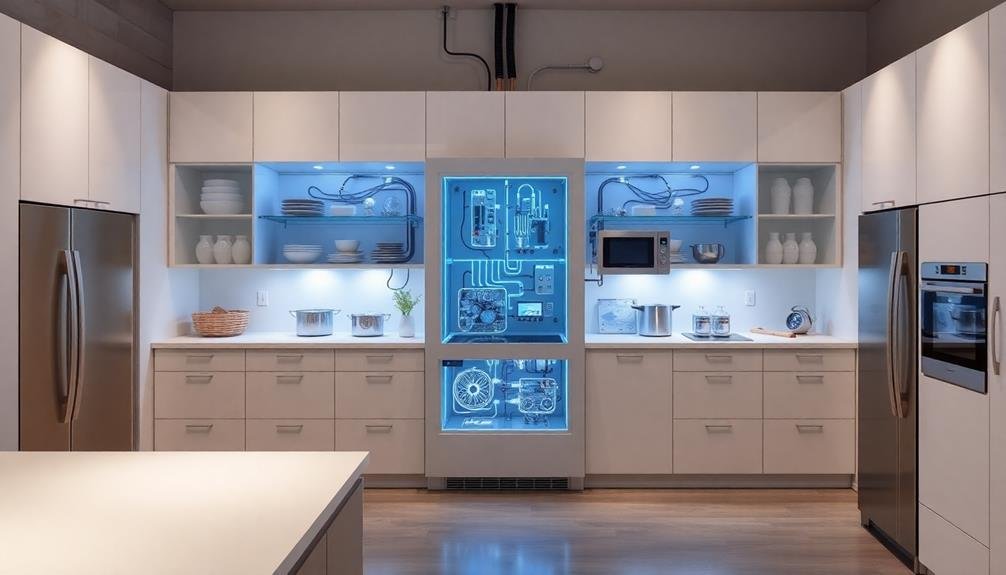
Within the domain of home fuel cell technology, several types have emerged as viable options for residential use. The most common are Proton Exchange Membrane (PEM) fuel cells, Solid Oxide Fuel Cells (SOFC), and Phosphoric Acid Fuel Cells (PAFC).
PEM fuel cells are compact and operate at lower temperatures, making them ideal for smaller homes. They're quick to start up and can handle fluctuating power demands. You'll find these in many residential fuel cell systems due to their reliability and efficiency.
SOFCs operate at higher temperatures and are more suited for larger homes or small businesses. They're highly efficient and can use a variety of fuels, including natural gas and biogas. You'll appreciate their durability and lower maintenance requirements.
PAFCs are less common in residential settings but offer steady performance and can tolerate impurities in fuel. They're often used in larger applications but can be scaled down for home use.
Each type has its advantages, and your choice will depend on factors like your home's size, energy needs, and local fuel availability. Consider consulting with a fuel cell specialist to determine the best option for your specific situation.
Installing a Residential Fuel Cell
The journey to a self-sustaining home begins with installing a residential fuel cell. You'll need to carefully plan and prepare for this significant upgrade to your home's energy system. Start by consulting with a certified fuel cell installer to assess your property's suitability and energy needs. They'll help you choose the right size and type of fuel cell for your home.
Before installation, you'll need to:
- Obtain necessary permits and approvals from local authorities
- Prepare the installation site, typically near your existing utility connections
- Guarantee proper ventilation and safety measures are in place
The installation process involves connecting the fuel cell to your home's electrical system and natural gas supply. Your installer will set up the fuel cell, inverter, and control systems. They'll also integrate it with your existing power grid connection for seamless operation.
After installation, you'll need to schedule regular maintenance to keep your fuel cell running efficiently. This includes replacing filters, checking connections, and monitoring performance.
With proper care, your residential fuel cell can provide reliable, clean energy for years to come, reducing your carbon footprint and energy costs.
Fuel Cell Powered Kitchen Appliances
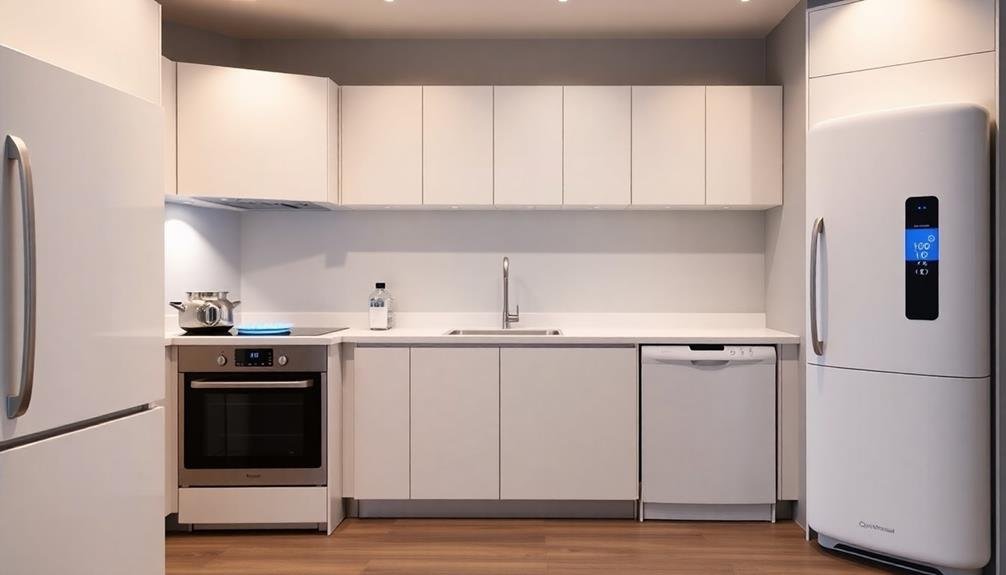
Increasingly, fuel cell technology is making its way into our kitchens, powering a range of appliances with clean, efficient energy. You'll find fuel cell-powered refrigerators, ovens, and even coffee makers that offer improved performance and reduced environmental impact.
Fuel cell refrigerators are particularly promising, as they maintain consistent temperatures while consuming less energy than traditional models. You'll enjoy longer-lasting food and lower electricity bills. Fuel cell ovens heat up faster and distribute heat more evenly, resulting in better cooking outcomes.
Here's a comparison of fuel cell appliances to their traditional counterparts:
| Appliance | Fuel Cell | Traditional |
|---|---|---|
| Refrigerator | Quieter | Noisier |
| Oven | Faster | Slower |
| Coffee Maker | Efficient | Less efficient |
| Dishwasher | Eco-friendly | Water-intensive |
| Microwave | Consistent | Variable |
When shopping for fuel cell kitchen appliances, look for certifications like Energy Star to guarantee you're getting the most efficient models. While initial costs may be higher, you'll save money in the long run through reduced energy consumption and maintenance needs. As the technology advances, expect to see more fuel cell-powered options for your kitchen, making your home more sustainable and cost-effective.
Heating and Cooling With Fuel Cells
Fuel cells' potential extends beyond the kitchen, revolutionizing home heating and cooling systems. You'll find that fuel cell-powered HVAC systems offer numerous advantages over traditional methods. They're more efficient, environmentally friendly, and can provide both heating and cooling from a single unit.
To heat your home, fuel cells generate electricity and produce heat as a byproduct. This heat is then used to warm your living spaces through radiant floor systems or forced air. For cooling, the process is reversed using absorption chillers that utilize the heat from fuel cells to create a cooling effect.
Here are three key benefits of fuel cell heating and cooling systems:
- Increased energy efficiency, reducing your utility bills
- Lower carbon emissions compared to fossil fuel-based systems
- Quiet operation, enhancing your home's comfort level
You'll need to work with a certified installer to set up a fuel cell HVAC system in your home. While the initial investment may be higher than traditional systems, you'll see long-term savings on energy costs and maintenance.
As technology advances, expect fuel cell heating and cooling to become more accessible and affordable for homeowners.
Maintenance and Safety Considerations
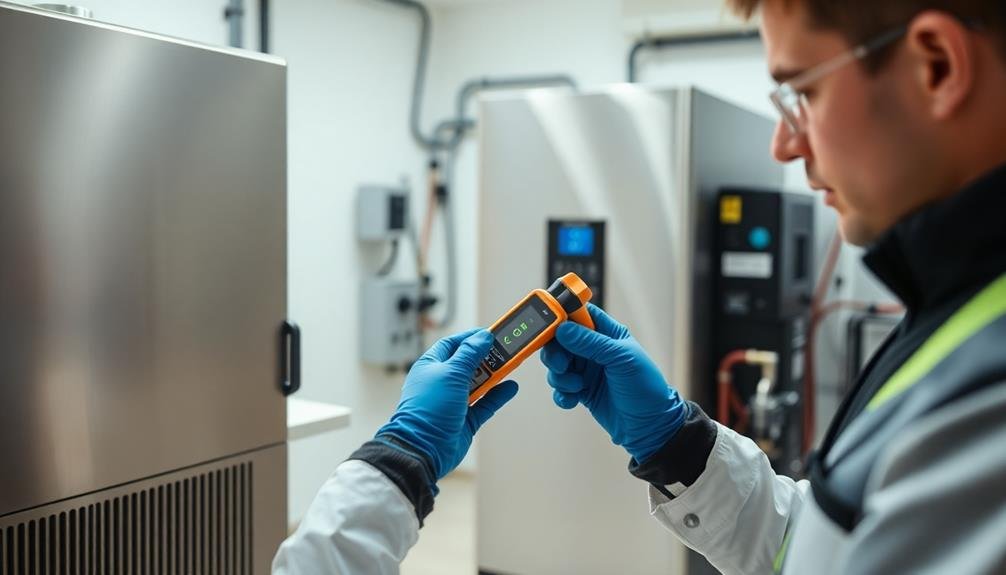
When considering fuel cell appliances for your home, it's important to understand the maintenance and safety aspects. Fuel cells require regular upkeep to guarantee peak performance and longevity. You'll need to replace the fuel cell stack every 5-7 years, depending on usage. Regular inspections of the system's components, including pumps, valves, and electrical connections, are vital.
Safety is paramount when dealing with fuel cell technology. Confirm proper ventilation in the installation area to prevent hydrogen buildup. Install hydrogen detectors near your fuel cell appliances and test them regularly. Always follow manufacturer guidelines for operation and maintenance.
You'll need to handle fuel safely, whether it's natural gas, propane, or hydrogen. If using hydrogen, work with certified professionals for fuel delivery and storage. Keep fire extinguishers nearby and educate your family on emergency procedures.
Fuel cell appliances produce water as a byproduct, so you'll need to manage drainage systems to prevent moisture issues. Regularly clean and maintain these systems to avoid clogs or leaks.
Lastly, schedule annual professional inspections to guarantee your fuel cell appliances remain in top condition and comply with local regulations.
Cost Analysis and Energy Savings
While maintenance and safety are key considerations, the financial aspect of fuel cell appliances is equally important. You'll need to weigh the initial investment against potential long-term savings. Fuel cell appliances typically have higher upfront costs compared to traditional alternatives, but they can offer significant energy savings over time.
To determine if fuel cell appliances are cost-effective for your home, consider these factors:
- Initial purchase and installation costs
- Fuel prices (natural gas or hydrogen) in your area
- Local utility rates for electricity
You'll find that fuel cell appliances often have higher efficiency ratings than conventional systems, which can translate to lower energy bills. They may also qualify for government incentives or tax credits, further offsetting the initial investment.
When calculating potential savings, factor in the lifespan of the fuel cell appliance, which can range from 10 to 20 years.
Remember that as technology advances, prices are likely to decrease, making fuel cell appliances more accessible. Consider consulting with an energy expert to get a personalized cost analysis based on your specific home and energy usage patterns.
Future of Home Fuel Cells
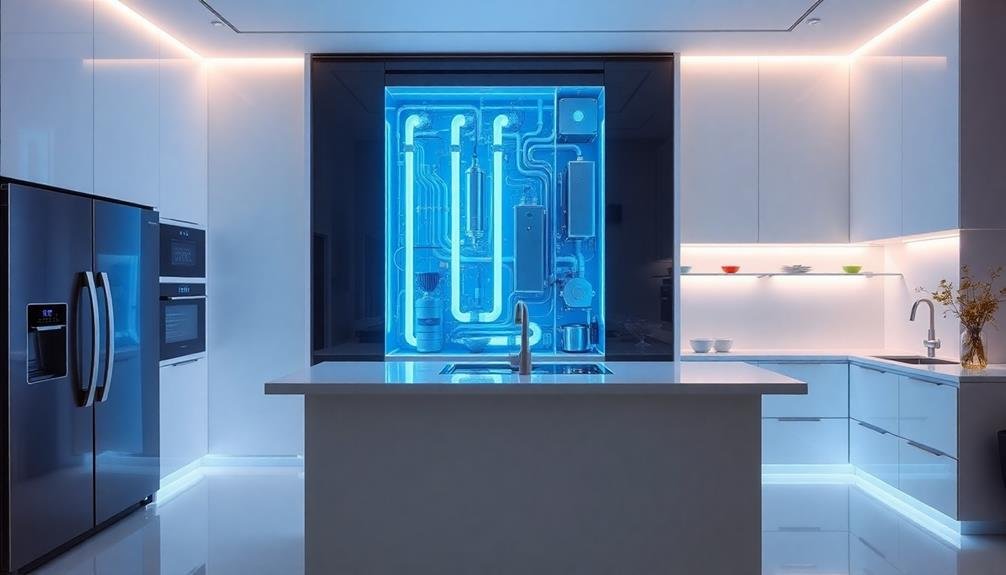
Three key trends are shaping the future of home fuel cells.
First, miniaturization is making fuel cells more compact and easier to integrate into your home. You'll soon see fuel cells small enough to power individual appliances or fit seamlessly into your existing HVAC system.
Second, improved efficiency is driving down costs and increasing energy output. As fuel cells become more efficient, you'll get more power for less money, making them increasingly competitive with traditional energy sources.
Third, advancements in fuel sources are expanding options beyond natural gas. You'll have the choice of using hydrogen, biogas, or even renewable methanol to power your home fuel cell. This flexibility will allow you to choose the most cost-effective and environmentally friendly option for your needs.
As these trends converge, you can expect to see fuel cells become a common feature in new home construction. They'll also become more accessible for retrofitting existing homes.
You'll benefit from lower energy bills, increased energy independence, and reduced carbon emissions. The future of home fuel cells is bright, and you're likely to see them become a mainstream home energy solution within the next decade.
Frequently Asked Questions
Are Fuel Cell Appliances Compatible With Existing Home Electrical Systems?
Yes, fuel cell appliances are generally compatible with your existing home electrical systems. You'll need a professional installation, but they can integrate seamlessly. They'll provide power alongside your current setup, enhancing your home's energy efficiency and reliability.
How Long Does It Take to Recoup the Initial Investment in Fuel Cells?
You'll typically recoup your fuel cell investment in 5-10 years, depending on energy costs and usage. It's faster if you're replacing expensive grid power. Consider incentives and rebates to shorten the payback period.
Can Fuel Cells Power an Entire House During a Grid Outage?
Yes, fuel cells can power your entire house during a grid outage. They'll provide continuous electricity as long as you have fuel. You'll need a properly sized system and enough fuel storage to meet your household's energy needs.
Are There Any Government Incentives for Installing Residential Fuel Cell Systems?
Yes, you'll find various government incentives for residential fuel cell systems. You can benefit from federal tax credits, state rebates, and local grants. Check with your state's energy office or utility company for specific programs available in your area.
What Happens to Fuel Cells at the End of Their Lifespan?
When your fuel cell reaches the end of its life, you'll need to recycle it properly. Many components can be reused or recycled. You should contact the manufacturer or a specialized recycling facility to dispose of it responsibly.
In Summary
You're on the cusp of a home energy revolution with fuel cell technology. By embracing this innovative power source, you'll reduce your carbon footprint and potentially slash energy bills. While there's an initial investment, the long-term benefits are substantial. As the technology advances, expect more affordable and efficient options. Stay informed, consider your household needs, and you'll be well-positioned to join the fuel cell movement when it's right for you.

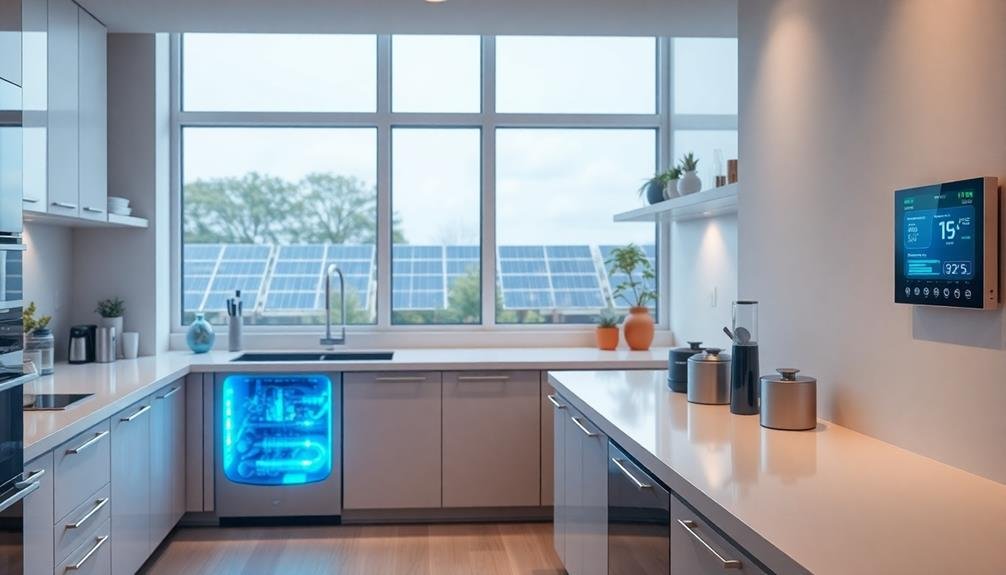
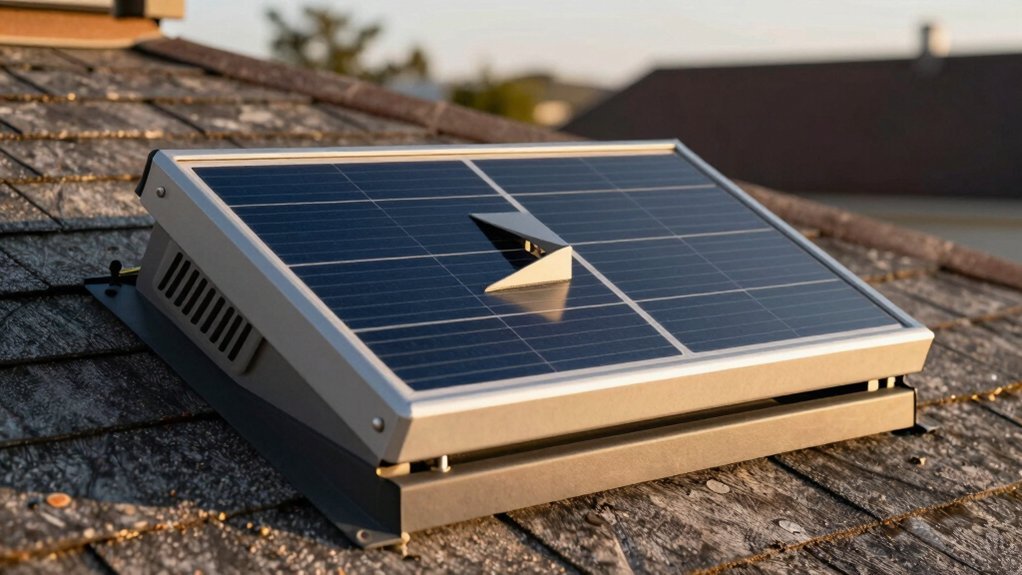

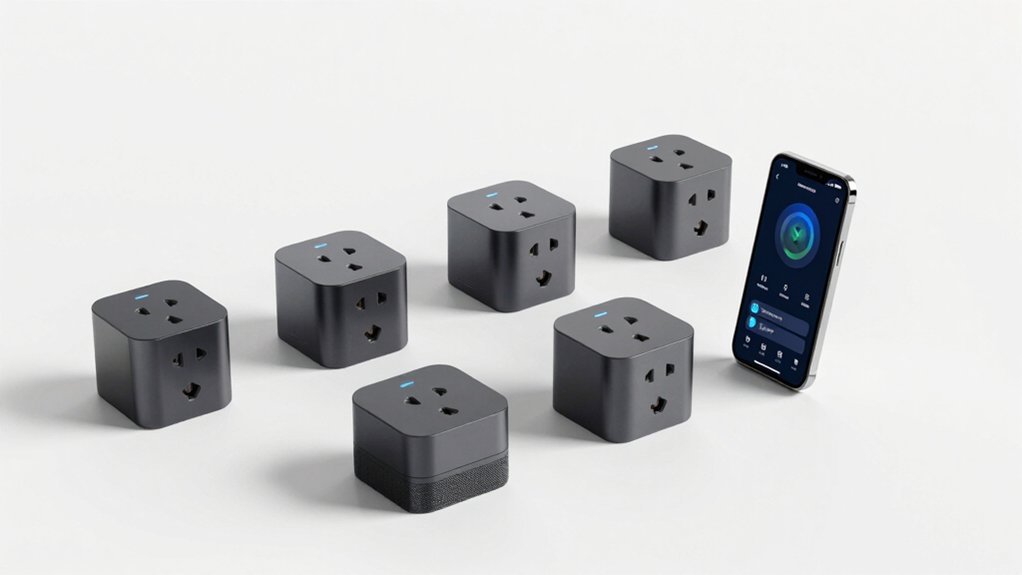
Leave a Reply